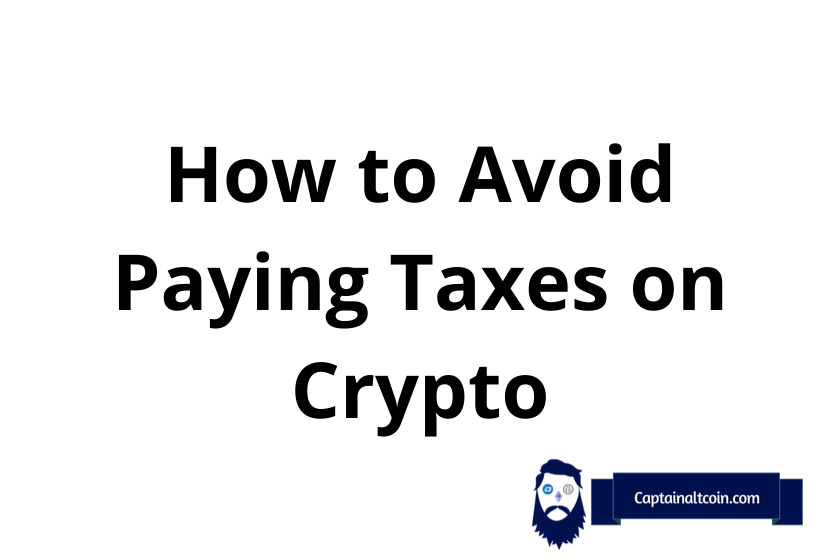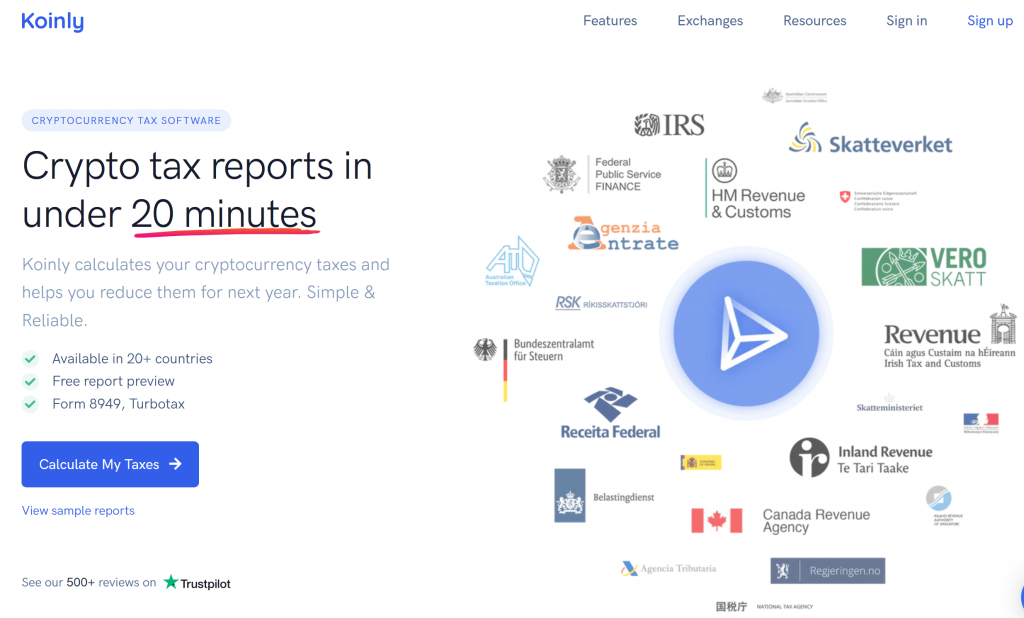
Disclaimer: I’d like to point out what a wonderful institution the IRS is, and how I’ve always admired their brave and noble work, serving our great nation and keeping us safe from our wealth.
Another disclaimer: I’m not a tax advisor and this isn’t taxing advice.
Ben Franklin famously posited “Death and Taxes” as the only two inevitabilities in life. Well, I intend to live forever, and I’m not convinced about the tax thing either. The 19th-century French economist Frédéric Bastiat had it that tax was theft, so to reduce crime, do we not all have a responsibility to pay as little tax as we can?
With this civic duty foremost in mind, I’ll explain some cryptocurrency tax obligations as they stand. It’s an ever-changing situation as mainstream adoption of crypto is now recognized as a threat by governments. I’ll also suggest ways to reduce your overall crypto tax burden. The brief was to write a ‘fun’ article on crypto tax. I love a challenge.
What you'll learn 👉
What are Crypto Taxes?
The government wants to take a part of your wealth each year. If you own crypto, they want some of that too. It’s the early stages of the world’s unstoppable transition to cryptocurrency, and our current tax laws could never have anticipated the situation we find ourselves in. They have become totally unfit for purpose and need to be relegislated. But that’s only half the problem.
The US Tax Code is notoriously complex and here’s why. Those that pay tax always search for new ways, within the law, to minimize their obligations. Each time a tax loophole is discovered, it’s patched with more regulation. This is no way to write efficient legislation as can be seen from the size and weight of the US tax code. Title 26 of the U.S. Code has it thinned down to a mere 2,652 pages across two volumes.
Within this outdated, overcomplicated tax code, there are still many ways to avoid overpaying tax on your crypto. Let’s take a look at the most obvious ones first.
How to Minimize Crypto Taxes
So, given the hot mess that is current crypto regulation and taxation, how do we avoid paying unnecessary contributions to the IRS? Let’s start with capital gains as this is the mechanism by which crypto is taxed, for the moment.
Determining Capital Gains vs. Capital Losses
Subtract your original asset purchase price from the net sale price. This is your capital gain or loss, and it’s on this amount that you will be taxed. This goes for stocks, bonds, real estate, art, and now cryptocurrency. The amount you pay depends on your income bracket, how long you hold an asset, and how much you can offset. There are limits to when you can do it, how much you can offset, and what type of assets are allowed.
The income threshold for capital gains tax is $40,000, above which you’ll pay 15%. Once your income is north of $500K, you pay at the full rate of 20%. There’s more to it than that as in certain circumstances only 50% of your capital gain is taxable. Check it out here, if you like. Did I mention there are 2,652 pages of it?
The take-home message is this. With certain restrictions, if you lose money on one asset, you can subtract the loss from your winnings on another, before they tax you.
Short-Term vs. Long-Term Capital Gains Tax
Hold an asset for less than one year before selling it and you pay short-term capital gains at your ordinary income tax rate. Hold it for more than a year and you pay long-term capital gains tax at the rate of 0%, 15%, or 20%, depending on your income bracket. There are caveats, however; so, so many caveats.
The bottom line is that hanging onto your assets for more than a year incurs less tax. It’s not always the case, however, so seek expert advice.
Top Tips for Lower Taxes
The golden rule here is that every crypto sale creates a taxable event. For a day trader executing dozens of trades per week, that sounds ridiculous. Happily, there are precautions you can take to mitigate this huge list of taxable events. For example, working within an IRA, or as part of your 401K can fix this problem.
We’ll review various software designed to manage your account profit and loss, at the end of the article. If you’re a long-time hodler of crypto you bought directly from the miner (or even mined yourself), nobody will know what you hold? Then again, veteran hodlers have the opportunity to disguise crypto wealth in many other ways, more of which later.
The great irony of the blockchain is that everything is transparent. If you were a plumber being paid in cash, you were expected to obey the honor system of taxation, honestly declaring what you made each year. There used to be an art to filing purchases through a company’s books as deductibles. I have an old friend who managed to amortize the purchase of two parrots (and their upkeep) for many years.
In contrast, The Cypherpunk ethos is Never Trust, Always Verify. So what we have is a new technology delivering financial freedom through being immutable, uncensorable, and unconfiscatable. At the same time, ironically, there’s nowhere to hide your tax evasion or other crimes. Every transaction you make is on display.
There are privacy coins and mixers to obfuscate the send and receive addresses. Sharding and, of course, some DeFi applications are at least pseudonymous. But overall, cryptocurrencies allow for more observation of your finances, not less. If a blockchain analysis team were motivated enough to know what crypto assets you own, they could find out eventually.
So, here are 9 legal ways to keep your cryptocurrency tax payments to a minimum.
Hold Until Your Short-Term Gains Turn Into Long-Term Gains
This one is self-explanatory. Remember, if you don’t sell an asset for more than one year, the capital gain is taxed at a lower rate, generally. It depends on your standard income tax rate, but hodlers should consider hodling for a minimum of 1 year for best results. Seek advice from a tax expert to know the details.
Offset Capital Gains with Capital Losses
Again, take away what you lost from what you made before “they” get their grubby little hands on it. This poses an interesting dilemma. The more you lose this year, the less you pay next year. If you do the math, you’ll find situations where you may as well burn a pile of money as give it to the revenue. In reality, you would probably donate it to charity, or bequeath it to your kids/family/friends, but the principle is the same.
A tax accountant would traditionally make this calculation and offer appropriate solutions, but like everyone else, they’re being replaced by software. See below for details.
Sell In a Low-Income Year
There are income thresholds of $40,000 and $500,000 which dictate your capital gains tax rate. Selling $250,000 of crypto in a year where you made $500k would be way less efficient than selling it in a year when you made $200k. If the bitcoin cost you $50,000, then you would pay 20% on your 200k gain in a high-income year. This is $40,000. If you pay it in a ‘bad’ year you would be gouged at 15% for a tax bill of $30,000.
This huge oversimplification ignores the uncountable nuances and subtleties that make up the US tax code. But the principle is sound. If you hold your wealth in cryptocurrency, timing is everything when realizing your profits. Pay close attention to this.
Reduce Your Taxable Income

There are several ways to reduce your taxable income. Earning less is my solution, but that has its own set of issues. Being seen to earn less by the IRS is the trick here. So, how do we do this? There are some suggestions below.
Invest in Crypto in a Self-Directed Individual Retirement Account
Acquiring wealth within an IRA allows us to take advantage of some very generous tax exemptions. As early as 2014, the IRS designated Bitcoin as ‘property,’ equivalent to stocks and bonds. An IRA is a private version of a 401K retirement savings plan, and anyone with earned income can set one up. They are usually administered through a broker, a bank, or a financial services company.
There’s a tax penalty for withdrawing your savings before the ripe old age of 59½ . For Millennials and Zoomers, this is out of the question. “That’s like literally forever away!” For GenX, it is the foreseeable future. It’s also around the time when crypto should be at its peak. Depending on your age, an IRA could be a great way to reduce your tax burden while you watch your retirement fund head for the moon.
There are limitations, however. In far too simple terms, those under 50 can contribute $6,000 per annum to an IRA. Savers over 50 can invest up to $7,000. This is offset against your income tax, so withdrawing your savings early incurs your ordinary rate of tax. If you’re in the ‘cocktail hour’ stage of your life, it’s definitely worth investigating.
Gift the Assets to a Family Member
This remarkable option was a total surprise to me. According to Forbes.com, there’s no income tax or capital gains tax when you gift crypto to a family member. Neither the donor nor the donee pays tax on the transaction. This allows you to utilize the many tax allowances of your family members, but only with their permission, of course.
So what’s the catch? Gifts are supposed to be given in the spirit of a gift, not as a tax convenience. Occasionally, the IRS will deny the tax relief if it’s obviously not a real gift. Read about the details here, along with other tax-efficient ways to gift your cryptocurrency.
I was interested to note that Forbes considers inheriting property to be better than being gifted property. Not for the donor, it isn’t!
Read also:
- Free Crypto Tax Calculators – Calculate Your Bitcoin Taxes For FREE
- Crypto.com Tax Tool Review – Free Tax Calculator by Crypto.com
- Binance Tax Calculators – 3 Steps to Calculate Binance Taxes
- Bitcoin Tax Free Countries – In These Countries You Pay 0% Tax On Your Bitcoin And Crypto
- Best Coinbase Tax Calculator – How To Calculate Your Coinbase Taxes
Donate Your Appreciated Cryptocurrency to Charity
There are no taxes associated with donating cryptocurrency to charity. As long as the assets are long-term holdings (more than one year), the donation can be offset against tax as an Itemized Charitable Deduction. So how does this help?
If you have massive bags of crypto that have 1000xed over the last few years, you can safely donate the correct portion to charity and knock that off your capital gains before it’s taxed. There’s a sweet spot – just the right amount to donate – that will save you the most amount of tax. Have a tax accountant look at it or read about it here.
Move to a State with No Income Tax
In order of hospitality, South Dakota, Texas, Wyoming, Florida, Nevada, Alaska, and Washington all have very accommodating tax laws. There’s no state income tax or state capital gains tax. South Dakota, previously only famous for Mount Rushmore and Little House on the Prairie, is now the billionaire capital of the world. Wyoming is known to be crypto-friendly and is at the cutting edge of regulation and integration.
These are only state taxes, however. Big Brother still wants to extract some of your wealth each year.
Ignore your tax obligations. What’s the worst that can happen?
It depends on who you are and where you’re domiciled. Having lived in Italy and Greece for several years, I learned to appreciate the fine art of diddling the taxman. In both countries, it was a national pastime and regarded as a duty, rather than antisocial behavior. This is understandable bearing in mind the two countries’ recent brushes with totalitarian fascist regimes. They both now have a healthy disrespect for their leaders and institutions.
In the US, however, you face one of the most intimidating, ubiquitous tax regimes on the planet. Merely being born in the states can incur tax liabilities. For example, even though British Prime minister Boris Johnson left the states as a young toddler, he still settled with the US government for 2 million dollars in lieu of tax on monies made entirely outside of and unrelated to the US. The IRS reaches far and wide.
For many old-school crypto-heads, the thought of mining interesting but worthless Bitcoin back in the day as a technology project, only for it to be then declared taxable, is not fair. I agree. This is one of the dangers of blockchain technology; how it will be used to reduce our freedoms. The centralized CBDC version (Central Bank Digital Currency) will be able to deduct any and all the taxes it desires. If you disagree about how much you should pay, they can just seize your account. There will be no meaningful negotiation.
For me, there’s a tricky calculus here. Given that CBDCs will be directly monitoring and controlling all our finances soon, is now a good time to acquire some decentralized cryptocurrency? I value owning private assets that cannot be controlled by governments – even if it means not being totally honest with the taxman now. Part of me is amazed that we can still buy decentralized cryptocurrencies with our fiat money. It won’t last forever.
I’m with the Greeks and Italians on this one.
Track Your Crypto Transactions – recommended tools
Calculating yearly profit and loss is never easy for traders. You’ll have buys and sells of varying quantities and prices. These will be split across dozens of cryptocurrencies on several exchanges. It’s virtually impossible to figure out by hand. Naturally, this niche is filled with platforms that are happy to assist. Here are a few of our favorites.
Koinly
Open an account at Koinly and you can set it to work figuring out your historical crypto activity. It’s not just spot trading. You can hook Koinly up to over 350 exchanges and it will figure out your overall profit and loss in a few minutes. This covers margin trading, spot trading, staking, lending, and even mining. If your exchange is not one of the 350, you can import a transaction file and Koinly will help you upload the data.

Koinly will also connect to 74 DeFi wallets and scrape your transaction data. You can pull information associated with many of the major blockchains, but Cardano and Solana are conspicuous by their absence. Koinly seems to have everything else covered.
The software will calculate your capital gains and even generate and fill in the schedule D forms. Koinly’s data formats are compatible with TurboTax, TaxAct, and H&R, so it’s a great option for retail traders for whom crypto makes up a small part of their income. Sign up here to check out the full suite of services.
Cryptotradertax
Another option compatible with TurboTax and TaxAct is Cryptotradertax. It’s similar in style to Koinly and works by accessing historical data from your crypto exchange accounts via an API. You can preview your online report for free before downloading it for a fee.
The fee depends on how many trades you execute over the year. There are 4 levels, Hobbyist @ $49 for 100 trades, Day Trader @ $99 for 1500 trades, High Volume @ $199 for 5000 trades, and unlimited trades for $299. This is a one-off fee paid each tax season for your yearly report. You can review the report before it’s printed, so you’re not committed to paying for anything unless you like the finished product.
I recommend checking out the Cryptotradertax Blog which is full of well-written, useful articles on tax and crypto. It covers everything in this article but goes into much more depth. It’s a great resource whether you buy their product or not.
Zenledger
Yet another option is Zenledger. You import your transactions, review them, then Zenledger will generate completed 8949 forms for Schedule 1 and Schedule D. You can add trades manually and remove anything that you are not happy with. Be careful here, as all the major centralized exchanges will happily hand over your trade data to the IRS. If you are unfortunate enough to be audited, you’d better make sure your version of the accounts agrees with the exchange’s version.
Zenledger’s price plans are based on your trade quantity, with 25 trades being free, up to 100 trades for $49, 5000 trades for $149, and unlimited trades for $399. The important detail here is that you need to pay for at least the $149 Premium account to include DeFi, staking, and margin trading. This has become a significant part of some people’s portfolios this year.
CoinTracking
CoinTracking calculates both your realized and unrealized gains. They prepare tax reports that deal with more than 13,000 assets. With close to one million users and 12 years of experience, they claim to be “The Leader for Cryptocurrency Tracking and Tax Reporting.”

CoinTracking connects to over 100 exchanges and generates reports for more than 100 countries. You can import your trading history from DeFi wallets and CoinTracking will clean up your data, highlighting duplicates and erroneous entries.
I couldn’t see how much CoinTracking costs, so it’s difficult to recommend. I’m always a bit suspicious of business services that don’t advertise their prices openly.
Conclusions and Thoughts
The first rule is not to take tax advice from strangers on the internet. Get the professionals in or do your research through government authorized websites.
Be aware that all major centralized exchanges will hand over your information to the IRS or any other government body that requests it.
Never tell lies to the IRS. Whether you tell them the whole truth is up to you, but cheating will eventually come back to haunt you.
The SEC is pressuring DeFi platforms to start collecting KYC. Any self-respecting platform would refuse and remain decentralized. The problem is when a platform you have used submits information to the SEC’s, all your historic data will be available.
Be at least as honest as you can get away with.






